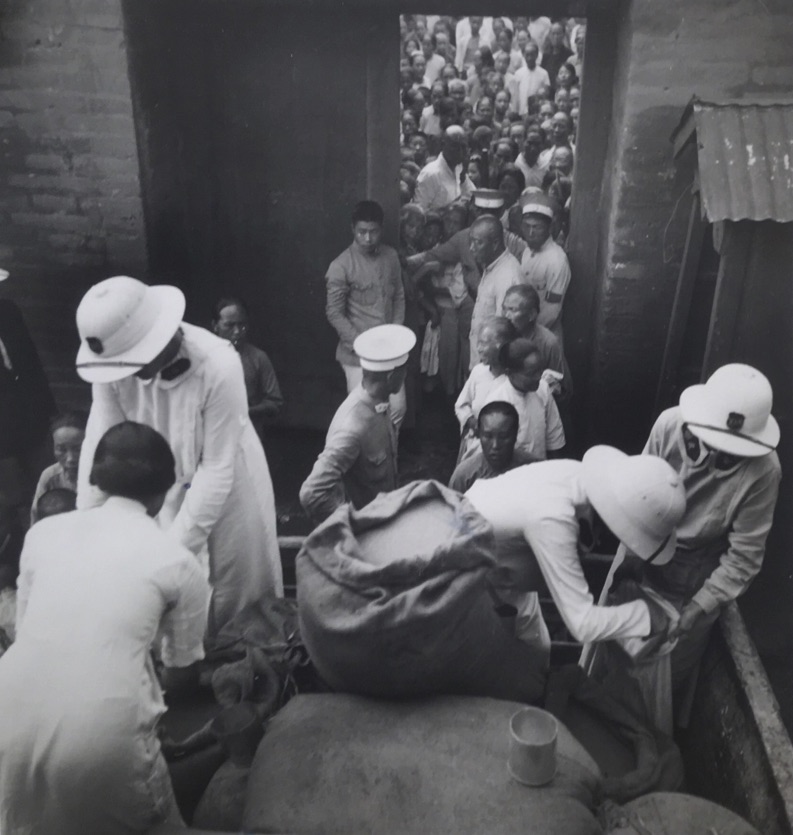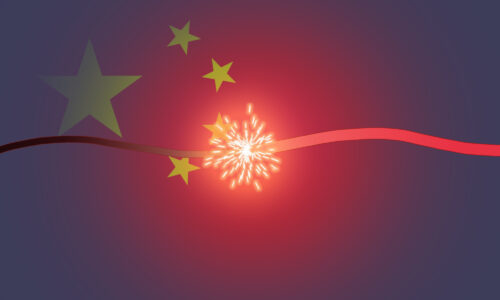Henan province is part of China’s heartland, yet it is relatively unknown to people in the West. Its name means “South of the (Yellow) River,” conveying its geographic position in a rich agricultural zone, producing cereals, soy, cotton, and other goods. The province also has a claim to being the birthplace of Chinese civilization, and its territory includes the ancient capital of Luoyang, one of China’s “four great ancient capitals” and a city of some 3 million people today. The cities of Anyang, Zhaoge, and Kaifeng also served as capitals of different Chinese dynasties, adding to Henan’s historical legacy.
In the fall of 1942, Henan briefly sprung to the attention of newspaper readers in the West. Christian missionaries in Luoyang and Zhengzhou sent urgent notices to the diplomats and reporters in China’s wartime capital, Chongqing, about a large famine spreading through the province. Anglophone newspapers printed reports of the catastrophe: “Thousands are dying daily…one of the worst famines in modern times.”
But World War II was ablaze, and only a small number of foreign reporters were left beside the meager assortment of expats and American soldiers in China. Shortly before the news from Henan, U.S. Marines had begun to fight for Guadalcanal, Allied soldiers landed at Dieppe in northern France for the first time, and Mohandas Gandhi launched the “Quit India” movement. Within weeks, the Second Battle of El Alamein would decide the fate of the Nazis’ advance in North Africa. The Battle of Stalingrad was at its peak. With no reporters inside Henan, Western media quickly moved to other topics.
Chinese journalists in Chongqing were not ready to forget the famine. In the fall and winter of 1942, streams of Henan refugees arrived in Chongqing by foot or rail. Effects of the crisis were appearing in other forms, too. Physical cash was vanishing from central China, in part flowing to occupied territories, as people parted with whatever they had to obtain food. Land and farming tools from Henan grew cheap. Then, Chongqing newspapers started reporting on the sale of children by starving families. On February 1, 1943, one of Chongqing’s newspapers, the Ta Kung Pao (大公報 dà gōng bào), explicitly condemned China’s Kuomintang officials for their failure to stop the famine. On February 2, the government ordered the paper to temporarily cease publication.
What triggered the Henan famine?
For years, Henan’s rural economy had been creaking under pressure. In 1938, Kuomintang forces escaping Nanjing for inland Sichuan dynamited Yellow River dikes to slow the approaching Japanese forces. The resulting floods submerged villages and damaged the land of perhaps millions of farmers. Blowing up the dikes did not stop Japan’s advance for long: in the fall of 1941, Japanese soldiers temporarily entered and looted Zhengzhou, Henan’s present-day capital city, before retreating.
From 1941 to 1944, Henan became a center of the war in China, a gateway toward bombed and weary Chongqing, where China’s relocated national government was trying to hold out. Every movement of armies brought new pressures on Henan’s rural population, which was forced to provide food, animals, and human labor to meet the demands of whatever army was present. Farmers were taken from their harvests to build roads and forts, or were drafted as soldiers. Some counties ordered the razing of barns and homes to prevent their potential use by invaders. When American traveler Graham Peck toured eastern Henan in the summer of 1941, he found a region on a precipice: “Taxes and requisitions had become so heavy, the average farmer knew that if the weather should get a little worse, or if this plow would break, this ox should die, he would be in serious trouble.”
Under these conditions, even small shocks could spiral into major disasters. As a result, blights from nature generated effects that could not be easily reversed even when natural conditions improved. Around April 1942, locusts appeared in eastern Henan. The weather was already dry in 1941, and droughts in 1942 added to farmers’ miseries. The war’s disruption of infrastructure and trade routes made it difficult to import surplus grain from Manchuria or overseas. In November 1942, U.S. diplomat John Service estimated that 1,000 people were fleeing the province each day during the previous summer, many months before the famine would peak.
But there was still grain in storehouses in Henan and neighboring provinces, and some supplies could be smuggled from Japanese-occupied areas. The larger problem, prolonging and exacerbating the famine, appeared to be the social and political breakdown in the province. Opportunists ranging from local aristocrats to traveling merchants to tax collectors and junior army officers took advantage of the shock to local food supplies by taxing or confiscating peasant holdings and selling food back to the rural population at a steep profit. Meanwhile, government relief efforts hardly helped: cash aid disappeared amid soaring prices, food aid came in too little and too slowly, and grain hoarding and confiscation continued. As food became scarce, criminal gangs grew in number to pillage hidden food supplies as early as the summer of 1941, worsening the societal breakdown.
Enter the foreign correspondent
The temporary closure of the Ta Kung Pao boosted the publication’s subscriptions and caught the attention of Teddy White (白修德 Bái Xiūdé), a young American journalist working for Time Magazine. White had not been to Henan before, but he was eager to escape the small expat circles in Chongqing and get closer to wartime action. In early March 1943, White left for Henan alongside an American photojournalist, Harrison Forman.
In the first few days of his trip, White was casual and upbeat. Then White encountered the famine. “This is the most terrible thing I have ever seen…the bodies lie out on the road, dead, with no marks on them that can be seen,” White wrote to a friend. Still, official requisitions continued. As the provincial governor told White and Forman, “China’s at war. It’s not a question whether the people are heavily burdened with taxes…the army must come first.”
White quickly penned a bitter report to Time describing the crisis and amplifying Ta Kung Pao’s criticisms of the authorities: “The famine might have been averted…By a tremendous miscalculation no grain was sent to the famine land.” White’s report somehow bypassed the Kuomintang’s censors, and on March 22, 1943, Time published it.
The report revived attention to the famine in the West and instantly made White a villain in Chongqing. “They said I was a communist trying to embarrass the Chungking government,” the young journalist informed his editors. “I came back to Chungking full of righteous wrath…before I knew it, my God, the whole town was up in arms against me.” Back in the U.S., China’s first lady, Soong Mei-ling (宋美齡 Sòng Měilíng), advocated unsuccessfully to have White fired from Time.
Over the following two weeks, White pleaded about the famine to anyone he could find in the wartime capital. Eventually he secured a brief meeting with Chiang Kai-shek (蔣介石 Jiǎng Jièshí), embarrassing China’s leader by presenting photographs of famine victims. White had assumed that the government was mostly ignorant of the famine, and railed against the Kuomintang’s incompetence for the rest of his life.
In fact, central authorities probably had a decent idea of the scale of the crisis, which had been noted by Chinese journalists, army officers, county officials, legislators, inspectors sent from Chongqing, and a handful of American-affiliated aid organizations for at least seven months before White’s journey. Central authorities started assigning funds for famine relief as early as August 1942. But officials felt themselves in a bind: there were crises all over China, and the government needed to extract resources from Henan’s rural population to sustain the war against Japan’s forces while delicately balancing regional power bases. Though Kuomintang leaders assembled a committee to support relief for the concurrent famine in Bengal, India, actively soliciting foreign food aid for Henan apparently did not seem like a suitable option.
What resulted from White’s advocacy? Some greater food aid made it to Henan. Thomas Megan, a Catholic priest from Iowa based in Luoyang, wrote to White at the end of April 1943 that “Famine [is] worse than ever. But I got a notion that you folks shook things up for a wee bit more is being done.” White heard that criticism from the U.S. had provoked Chinese authorities to rally additional food shipments and open more soup kitchens in Henan’s cities, saving at least a few thousand people.
Nevertheless, starvation lingered until 1944. Millions of Henan residents fled to other provinces, and likely some 2 to 5 million perished. The famine spread popular anger against China’s rulers: in 1944, Henan villagers rose up and were reported to have forcibly disarmed some 50,000 Kuomintang-aligned soldiers. Overseas, the famine hardened the views of journalists like White against the Kuomintang. In his bestselling 1946 book Thunder Out of China, White seethed that the “government failed to foresee the famine; when it came, it failed to act.”
Henan received little coverage in the Western press in the decades before White’s trip. During Mao’s rule, Henan was again hidden from most Western audiences. White’s reporting could only go so far: officials now viewed him suspiciously, and famine reports could not replace the cheery “local color” stories that White saw Western editors demanding.
But White’s short visit in March 1943, and his advocacy in April, should still give us a glimmer of hope. Expanding on the work of Chinese journalists, White collected solid data and evidence of the famine in several of Henan’s counties, and brought international attention that led to some mitigation of a mass catastrophe. His efforts show the potential good that even a censored, severely limited international press can have in parts of China far from the bustling, visible metropolises.






